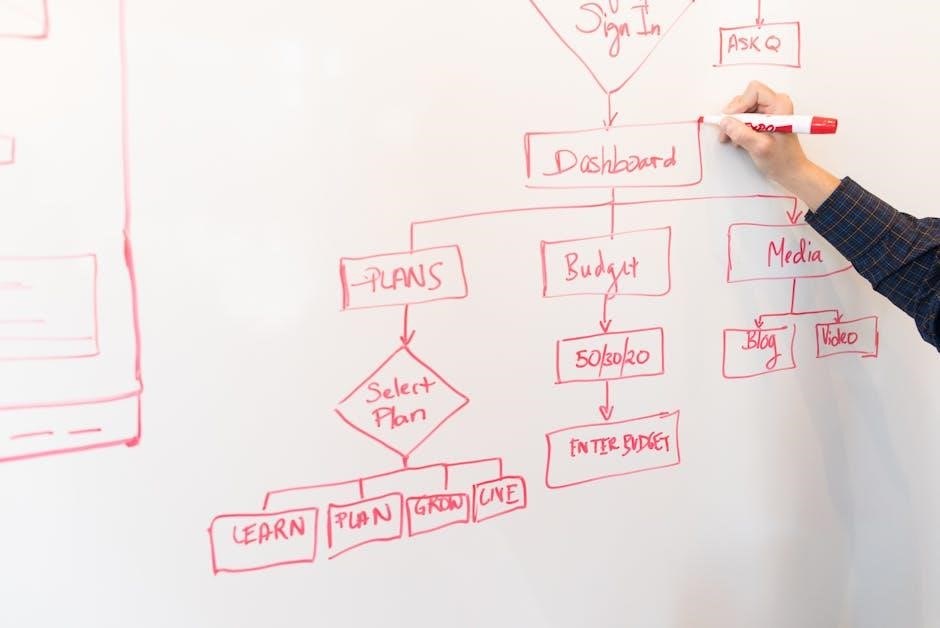Moral improvement via instruction is the process of fostering ethical values and principles through structured learning. It focuses on developing empathy, critical thinking, and ethical decision-making skills. By integrating moral education into instructional frameworks, individuals can cultivate a stronger sense of responsibility and integrity; This approach is essential for personal growth and societal well-being, ensuring individuals navigate complex challenges with a sound moral compass. Instructional methods play a pivotal role in shaping moral behaviors, making ethical education a cornerstone of sustainable societal development.
1.1. Definition of Moral Improvement
Moral improvement refers to the educational process of shaping and refining an individual’s ethical values, principles, and behaviors. It involves the transformation and internalization of moral norms, fostering a sense of responsibility and integrity. Through structured instruction, moral improvement aims to cultivate empathy, critical thinking, and ethical decision-making skills. This process is essential for personal growth and societal well-being, ensuring individuals can navigate complex challenges with a sound moral compass. By integrating moral education into instructional frameworks, moral improvement becomes a cornerstone for sustainable human morality and ethical development.
1.2. The Role of Instruction in Moral Development
Instruction serves as a cornerstone in moral development, providing structured guidance to shape ethical awareness and behavior. By teaching moral principles, values, and norms, instruction equips individuals with the tools to navigate ethical dilemmas. It fosters critical thinking, enabling learners to evaluate situations and make decisions aligned with moral standards. Instruction also promotes empathy and understanding, encouraging individuals to consider the consequences of their actions. Through deliberate teaching methods, instruction cultivates a moral framework that supports personal growth and contributes to a harmonious society, emphasizing the importance of ethical behavior in everyday life.
1.3. Importance of Ethical Education in Modern Society
Ethical education is vital in modern society, addressing the complexities of moral issues in an increasingly interconnected world. It equips individuals with the ability to make informed, responsible decisions, fostering a sense of accountability. By promoting empathy, respect, and justice, ethical education cultivates a society that values human dignity and collective well-being. It prepares future generations to navigate ethical challenges, ensuring they contribute positively to societal progress. Neglecting ethical education risks a disjointed, morally indifferent world, highlighting its necessity in building a compassionate and ethical global community.

Theoretical Foundations of Moral Instruction
Moral instruction is rooted in psychological theories, ethical models, and philosophical frameworks that explain human development and decision-making, providing a structured approach to teaching morality.
2.1. Moral Development Theories
Moral development theories provide frameworks for understanding how individuals acquire ethical values and principles. Kohlberg’s stages of moral development propose a progressive journey from punishment-obedience to principled morality. Similarly, Gilligan’s theory highlights the importance of care ethics, emphasizing empathy and relationships. These theories suggest that moral growth is shaped by cognitive, social, and emotional experiences. Instructional strategies can align with these theories by incorporating discussions, reflections, and role-playing to foster critical thinking and empathy. Understanding these theories helps educators design effective moral instruction tailored to different developmental stages and learning needs.
2.2. Ethical Decision-Making Models
Ethical decision-making models offer structured approaches to resolving moral dilemmas. The Utilitarian Approach prioritizes outcomes, aiming for the greatest good for the greatest number. In contrast, Kantian Ethics focuses on duties and universal moral laws. Virtue Ethics emphasizes character traits like honesty and compassion. These models guide individuals in evaluating situations, weighing consequences, and making principled choices. By teaching these frameworks, instruction helps learners develop systematic ways to approach ethical challenges, fostering clarity and confidence in decision-making. These models are essential tools for cultivating moral reasoning and practical wisdom in various contexts.
2.3. Psychological Basis of Moral Learning
Moral learning is deeply rooted in psychological processes, including emotional development, cognitive reasoning, and social interactions. Research shows that emotions like empathy and guilt play a crucial role in shaping moral judgments. Cognitive development theories, such as Kohlberg’s stages of moral development, highlight how individuals progress in understanding ethical principles. Instruction reinforces these processes by fostering critical thinking and self-reflection. Positive reinforcement and role modeling also contribute to moral growth, as learners internalize ethical values and behaviors. Understanding these psychological foundations helps tailor instruction to effectively promote moral development and ethical decision-making skills.

Key Components of Moral Instruction
Moral instruction involves core values, empathy, and critical thinking, guiding individuals to navigate ethical dilemmas and foster a moral mindset through structured, principled learning experiences.
3.1. Core Values and Principles
Core values and principles are the foundation of moral instruction, serving as guiding pillars for ethical behavior. These include honesty, respect, fairness, and responsibility, which are essential for fostering a moral mindset. By instilling these values through education, individuals develop a clear understanding of right and wrong, enabling them to make ethical decisions. These principles are often universal, transcending cultural differences, and provide a framework for evaluating actions and their consequences. Teaching these values early in life helps shape character and promotes a lifelong commitment to ethical living, ensuring individuals contribute positively to society.
3.2. Empathy and Compassion Development
Empathy and compassion are vital components of moral instruction, fostering the ability to understand and share the feelings of others. By cultivating these traits, individuals develop a deeper sense of responsibility toward others and society. Instructional methods that encourage perspective-taking, such as role-playing or shared storytelling, help learners connect emotionally with diverse experiences. Educators play a crucial role in modeling empathetic behavior and creating opportunities for students to engage in acts of kindness. Nurturing compassion equips individuals with the moral capacity to address social inequalities and promote harmony in interpersonal relationships, laying the groundwork for a more empathetic and caring society.
3.3. Role of Critical Thinking in Moral Growth
Critical thinking is essential for moral growth, as it enables individuals to analyze complex ethical dilemmas and make informed decisions. By fostering analytical skills, instruction helps learners evaluate evidence, identify biases, and consider multiple perspectives. This process encourages the development of well-reasoned moral judgments rather than relying on unquestioned beliefs. Educators can promote critical thinking through open discussions, debates, and problem-solving activities. Cultivating this skill empowers individuals to navigate moral complexities thoughtfully, leading to more ethical and responsible behavior in personal and societal contexts.

Instructional Methods for Moral Improvement
Instructional methods for moral improvement include service learning, group discussions, and reflective exercises, fostering engagement and practical application of ethical principles and values in real-life contexts.
4.1. Case Studies and Real-Life Scenarios
Case studies and real-life scenarios are powerful tools for moral instruction, enabling learners to analyze complex situations and apply ethical principles. By examining real events, individuals develop critical thinking and empathy, fostering a deeper understanding of moral dilemmas. These methods encourage active engagement, allowing learners to explore consequences of actions and develop informed decisions. Real-life contexts make moral lessons relatable, helping individuals connect theoretical knowledge to practical application. This approach cultivates problem-solving skills and prepares learners to navigate ethical challenges effectively in personal and professional settings, enhancing their moral judgment and decision-making abilities over time.
4.2. Storytelling and Narrative Techniques
Storytelling and narrative techniques are effective methods for moral instruction, as they engage emotions and imagination, making ethical lessons memorable. Through relatable characters and plotlines, stories illustrate moral dilemmas and their resolutions, fostering empathy and critical thinking. Narratives often highlight universal values, encouraging reflection on right and wrong. This approach creates emotional connections, making moral concepts more accessible and impactful. Storytelling also allows for diverse perspectives, enriching learners’ understanding of ethical complexities. By immersing individuals in meaningful stories, educators can inspire moral growth and empower learners to apply these lessons in real-life situations, promoting a deeper understanding of ethical behavior and decision-making.
4.3. Interactive and Engaging Learning Activities
Interactive and engaging learning activities are crucial for fostering moral growth through instruction. Techniques like role-playing, group discussions, and problem-solving exercises encourage active participation, helping learners apply ethical principles in practical scenarios. These activities promote critical thinking, collaboration, and empathy, enabling individuals to explore diverse perspectives and develop well-rounded moral reasoning. By involving students directly, interactive methods enhance motivation and retention of ethical lessons. They also create opportunities for immediate feedback, allowing learners to refine their understanding and decision-making skills in a supportive environment. This approach ensures moral instruction is dynamic, relatable, and impactful, preparing individuals to navigate real-world ethical challenges effectively.

The Role of Educators in Moral Development
Educators play a vital role in shaping moral values by serving as role models, fostering inclusive environments, and encouraging ethical discussions that promote empathy and responsibility.
5.1. Teacher as a Moral Role Model
Teachers serve as significant moral role models, influencing students through their actions and behavior. By demonstrating honesty, respect, and fairness, educators foster trust and admiration. Their consistent display of ethical conduct helps students internalize moral values. Teachers’ role extends beyond academics, shaping character by promoting empathy, kindness, and responsibility. Their presence in students’ lives often leaves a lasting impact, guiding young minds to adopt positive behaviors and ethical decision-making. The teacher’s moral example becomes a cornerstone for students’ moral development, inspiring them to strive for integrity and compassion in their own lives.
5.2. Creating a Supportive Learning Environment
A supportive learning environment is crucial for fostering moral growth and ethical awareness. Teachers can cultivate this by promoting respect, inclusivity, and empathy among students. Encouraging open communication and active listening helps students feel valued and secure. Incorporating collaborative activities and group discussions fosters a sense of community, enabling students to explore moral dilemmas collectively. A safe and encouraging atmosphere allows learners to express their thoughts without fear of judgment, facilitating deeper reflection on ethical issues. This environment not only enhances moral development but also prepares students to navigate complex social and ethical challenges with confidence and compassion.
5.3. Encouraging Open Discussions on Ethics
Encouraging open discussions on ethics is vital for moral development. Educators should foster an environment where students feel comfortable exploring complex ethical issues. Active listening and respectful dialogue should be promoted to ensure diverse perspectives are heard. Open-ended questions can stimulate critical thinking and encourage students to articulate their beliefs. Teachers can also use real-life scenarios to make discussions relatable. By fostering a culture of inquiry and debate, educators help students develop ethical reasoning skills and empathy. Such interactions prepare learners to engage thoughtfully with moral dilemmas in their personal and future professional lives, fostering a deeper understanding of ethical principles.

Technology’s Role in Moral Instruction
Technology enhances moral instruction by providing interactive content, simulations, and global resources. It engages learners through immersive experiences, fostering ethical awareness and decision-making skills effectively.
6.1. Digital Tools for Ethical Education
Digital tools like interactive apps, games, and virtual platforms are transforming ethical education. They offer engaging, personalized experiences, making complex moral concepts accessible. These tools incorporate real-life scenarios, encouraging users to explore ethical dilemmas in a safe environment. Apps such as Moral Dilemma and Ethics Lab provide structured exercises to enhance decision-making skills. Interactive simulations allow learners to see the consequences of their choices, fostering empathy and critical thinking. Additionally, digital platforms enable global collaboration, exposing students to diverse perspectives. These tools not only modernize moral instruction but also ensure accessibility for learners of all backgrounds and learning styles.
6.2. AI and Moral Reasoning Simulations
AI-driven simulations are revolutionizing moral reasoning by presenting users with ethical dilemmas in controlled environments. These tools use algorithms to adapt scenarios based on user decisions, offering personalized learning experiences. AI systems analyze choices and provide immediate feedback, helping learners understand the implications of their actions. Simulations cover diverse ethical issues, from privacy concerns to societal justice. By engaging with these virtual challenges, individuals develop critical thinking and ethical problem-solving skills. AI’s ability to recreate real-world complexities makes it an invaluable resource for fostering moral reasoning and preparing learners for ethical challenges in an increasingly complex world.
6.3. Online Platforms for Moral Development
Online platforms are increasingly being utilized to promote moral development through structured programs and interactive content. These platforms offer courses, quizzes, and discussions designed to enhance ethical awareness and decision-making skills. Many incorporate gamification elements to engage users, making learning enjoyable and effective. They also provide access to real-world case studies and ethical scenarios, enabling users to apply moral reasoning in practical contexts.
Such platforms often include forums for peer discussions, fostering a sense of community and shared learning. By leveraging technology, these tools make moral education accessible to diverse audiences, ensuring broader reach and inclusivity in ethical development.

Cultural and Societal Influences on Moral Instruction
Cultural and societal influences significantly shape moral instruction, as diverse norms and values guide ethical education across communities. They shape the content and methods of moral education, reflecting community expectations and traditions.
7.1. Cross-Cultural Perspectives on Morality
Cross-cultural perspectives on morality reveal diverse ethical frameworks shaped by unique histories, religions, and values. These differences influence how moral instruction is perceived and implemented globally. For instance, some cultures emphasize collectivism and community welfare, while others prioritize individual rights and autonomy. Understanding these variations is crucial for developing inclusive moral education. It highlights the importance of cultural sensitivity and adaptability in teaching ethics. By recognizing and respecting these differences, educators can foster moral growth that resonates with learners from varied backgrounds, promoting global understanding and harmonious coexistence.
7.2. Societal Norms and Ethical Education
Societal norms significantly influence ethical education, as they shape the moral values and expectations taught to individuals. These norms often reflect a culture’s history, beliefs, and social structures, dictating what is considered right or wrong. Ethical education must align with these norms to resonate with learners, yet it also plays a role in challenging or evolving them. For example, societal norms around respect for authority or community welfare often form the basis of moral instruction. Educators must balance adherence to these norms with fostering critical thinking and adaptability to prepare individuals for ethical decision-making in diverse contexts.
7.3. Global Approaches to Moral Instruction
Global approaches to moral instruction vary widely, reflecting diverse cultural, religious, and philosophical traditions. Some regions emphasize community service and collective responsibility, while others focus on individual rights and freedoms. In many countries, moral education is integrated into school curricula, often drawing from local values and histories. Technology has enabled cross-cultural exchange, allowing for the sharing of ethical practices worldwide. However, globalization also presents challenges, as differing moral frameworks must be reconciled. Effective global approaches often blend universal principles, such as respect and justice, with culturally specific values to foster ethical understanding and cooperation across borders.

Measuring the Effectiveness of Moral Instruction
Measuring the effectiveness of moral instruction involves assessing behavioral changes, ethical decision-making, and emotional growth through surveys, observations, and real-world applications, ensuring lasting moral development.
8.1. Assessment Methods for Moral Growth
Evaluating moral growth involves both quantitative and qualitative assessments. Surveys and questionnaires measure self-reported behaviors and attitudes, while interviews and observations provide deeper insights. Practical exercises, like ethical dilemmas, test decision-making skills. Reflective journals track personal development over time. Standardized tools assess empathy, honesty, and responsibility. Peer and self-assessments encourage accountability and self-awareness. These methods help educators understand the impact of instruction and identify areas for improvement, ensuring a comprehensive approach to moral development.
8.2. Impact of Instruction on Behavioral Change
Effective moral instruction significantly influences behavioral change by fostering ethical decision-making and responsible actions. Through structured learning, individuals develop empathy, honesty, and respect for others. Instructional programs often lead to improved self-control, reducing harmful behaviors like bullying or dishonesty. Positive changes are evident in increased kindness, cooperation, and accountability. These behaviors reflect internalized moral values, demonstrating the powerful impact of ethical education on real-world actions. By addressing both cognitive and emotional aspects, instruction cultivates a strong moral compass, guiding individuals toward ethical living and contributing to a more compassionate society.
8.3. Long-Term Outcomes of Ethical Education
Ethical education fosters lasting moral growth, shaping individuals’ values and actions over time. Long-term outcomes include increased empathy, stronger moral reasoning, and a commitment to social responsibility. Educated individuals often exhibit higher levels of integrity, respect for diversity, and civic engagement. These traits contribute to personal fulfillment and societal well-being. Ethical education also cultivates leaders who prioritize justice and compassion, creating a lasting impact on communities. The enduring effects of ethical learning ensure a legacy of moral awareness and responsible behavior, benefiting future generations and society as a whole.

Challenges in Implementing Moral Instruction
Implementing moral instruction faces challenges like diverse beliefs, balancing academics, and addressing controversial issues, requiring educators to navigate complex societal norms and individual values effectively.
9.1. Diverse Student Backgrounds and Beliefs
Diverse student backgrounds and beliefs present significant challenges in moral instruction. Students from varying cultural, religious, and socioeconomic contexts bring differing values and perspectives, making it difficult to create universally accepted moral frameworks. Educators must navigate these differences sensitively to avoid alienating or marginalizing any group. Additionally, balancing individual beliefs with collective moral goals requires careful planning and adaptability. Addressing these disparities while fostering inclusivity and respect is essential for effective moral instruction, ensuring all students feel valued and engaged in the learning process.
9.2; Balancing Academic and Moral Education
Balancing academic and moral education is a significant challenge in modern schooling. Educators often struggle to allocate sufficient time to both areas, as academic rigor frequently takes precedence. Moral instruction risks being marginalized if not integrated thoughtfully into the curriculum. To address this, schools must prioritize holistic education, ensuring moral lessons complement academic goals. This requires innovative teaching strategies and collaboration among educators to create a seamless blend of intellectual and ethical development. By doing so, students can achieve both academic excellence and moral maturity, preparing them for lifelong success and responsible citizenship.
9.3. Addressing Controversial Ethical Issues
Addressing controversial ethical issues in moral instruction presents a unique challenge, as educators must navigate diverse perspectives and sensitivities. These issues often involve conflicting values, cultural norms, and societal expectations, requiring careful handling to avoid alienating students or stakeholders. Educators should foster open, respectful discussions, encouraging critical thinking and empathy. By using case studies, debates, and reflective exercises, instructors can help students develop nuanced understanding and ethical reasoning. Neutral, fact-based approaches are essential to ensure inclusive and constructive dialogue, equipping students to engage with complexity thoughtfully and responsibly.

Future of Moral Instruction
The future of moral instruction lies in integrating technology, fostering global collaboration, and emphasizing continuous ethical learning to address evolving societal challenges and technological advancements responsibly.
10.1. Emerging Trends in Ethical Education
Emerging trends in ethical education emphasize technology integration, fostering immersive learning through AI, virtual reality, and gamification. These tools simulate real-life moral dilemmas, enhancing decision-making skills. Global perspectives are being incorporated to address diverse cultural values, preparing students for worldwide challenges. Personalized learning tailors ethical lessons to individual experiences, increasing engagement. Sustainability is increasingly integrated, highlighting ethical responsibilities toward the environment. Lastly, interdisciplinary approaches combine ethics with STEM, providing practical, context-specific understanding. These innovations aim to create a more adaptive and impactful ethical education system for future generations.
10.2. Integrating Moral Instruction into Curriculum
Integrating moral instruction into the curriculum involves embedding ethical principles across subjects, fostering holistic development. Cross-curricular approaches ensure consistency, with ethics woven into lessons like history, science, and literature. Teachers receive professional development to effectively incorporate moral discussions. Community involvement enhances relevance, connecting classroom learning to real-world issues. Student-led projects encourage personal reflection and application of ethical values. Continuous assessment ensures moral growth aligns with academic goals. This seamless integration prepares students to navigate complex ethical dilemmas thoughtfully, fostering a generation of responsible, empathetic individuals capable of contributing positively to society.
10.3. Preparing for Future Moral Challenges
Preparing students for future moral challenges requires fostering critical thinking, empathy, and adaptability. Educators emphasize the importance of ethical decision-making in evolving scenarios, such as technological advancements and societal shifts. By integrating real-world case studies and simulations, students gain practical experience in navigating complex dilemmas. Encouraging open-mindedness and resilience equips them to address unforeseen ethical issues. Cultivating a growth mindset ensures they remain adaptable and committed to lifelong moral learning. These strategies empower individuals to confront future challenges with confidence, wisdom, and a strong moral compass, ready to contribute positively to an ever-changing world.
Moral instruction is vital for fostering a morally improved society. It cultivates empathy, critical thinking, and ethical decision-making, leading to responsible individuals who positively impact their communities.
11.1. Recap of Moral Improvement via Instruction
Moral improvement via instruction is a structured approach to developing ethical awareness and behavior. It relies on foundational theories, such as moral development stages, and practical methods like case studies. Key components include empathy, critical thinking, and core values, which are nurtured through engaging activities and role modeling by educators. Technology enhances accessibility, while cultural contexts shape ethical perspectives. Assessing effectiveness ensures lasting behavioral change. Despite challenges like diverse beliefs and controversial issues, moral instruction remains essential for preparing individuals to navigate future ethical dilemmas responsibly, fostering a morally conscious and compassionate society.
11.2. The Importance of Continuous Ethical Learning
Continuous ethical learning is vital for sustained moral growth and adaptability in a rapidly changing world. As individuals encounter new challenges, ongoing education refines their ability to make informed, compassionate decisions. It fosters a mindset of self-reflection and openness to diverse perspectives, ensuring ethical awareness evolves alongside societal shifts. By prioritizing lifelong learning, individuals and communities can address emerging issues like technology’s ethical implications and global complexities. This commitment to growth ensures moral resilience, equipping people to navigate future challenges with integrity and wisdom.
11.3. Final Thoughts on the Future of Moral Education
The future of moral education lies in its ability to evolve with societal needs, embracing innovation while preserving core ethical values. Integrating technology and interdisciplinary approaches will enhance learning experiences, making moral instruction more accessible and engaging. Educators must adapt to teach critical thinking and empathy, preparing individuals to navigate complex global challenges. By fostering collaboration between schools, communities, and policymakers, moral education can become a cornerstone of societal progress, nurturing a future generation equipped to address ethical dilemmas with wisdom and compassion.